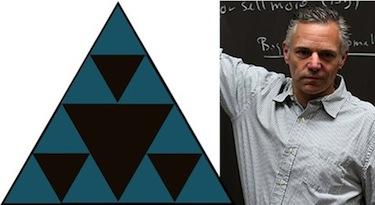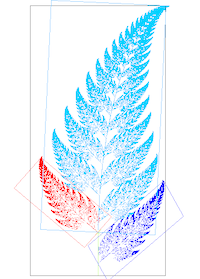
- 12 Aug 2015
In this post we interview David Feldman, the instructor for our new "Fractals and Scaling" course. David Feldman is Professor of Physics and Mathematics at College of the Atlantic. He has twice offered a massive open online course (MOOC) on Chaos and Dynamical systems on the Complexity Explorer site. We asked him to tell us a little about his new course, and about his experience teaching MOOCs.
Tell us a little about where fractals and scaling intersect with complex systems.
Fractals are objects that are self-similar – parts of them resemble the whole, so there’s some relationship that’s constant across different scales. The key idea is that we can describe fractals with a dimension, which has become a very common tool in science. It’s a way of describing and working with certain shapes. If you have a rough surface or some irregular distribution, you can now ask, ‘what’s the dimension or exponent?’
Historically, fractals have found uses describing mountain ranges or river systems, and there are many fun ways in which fractals arise in pure mathematics. But the areas that are of particular interest to complex systems – which is mostly what this course is about – isn’t the Mandelbrot set or the Julia set, but more recent applications to metabolic systems and urban scaling.
It's an interesting fact that many complex systems exhibit scaling behavior, at least to a good approximation. So understanding what scaling is, how to determine if a system exhibits scaling, and how to estimate dimensions, are all important skills for the study of complex systems. Students will learn about all of this in the course.
This is your third time running a MOOC with Complexity Explorer. From your past experiences, what kind of suggestions do you have for students to get the most out of this MOOC?
It’s a cliché, but you get out of it what you put into it. If students just do the minimum to get a certificate, well, they’ll get a passing acquaintance with the material. But if they engage with the material, do the optional work, and participate in the discussion forum, it’ll be a rich, academic experience.
Also, I thnk that a MOOC is many things all at once, so that focusing on the course element of the MOOC misses some of the other uses. There may be someone who just wants to know ‘what’s the deal with power laws?’ or ‘what's up with urban scaling?’ so maybe they just want to check out that single unit.
What have you learned from your previous course (Introduction to Dynamical Systems and Chaos) that you plan to focus on with the fractals and scaling course?
My hope is that the course will appeal to a group of students with a very wide range of backgrounds. In the course I did before, I occasionally discussed differential equations and calculus. Students who hadn't studied calculus got an accessible introduction to the subject, and I believe that students with engineering and physics backgrounds found it a really nice complement to their past study. I’m hoping for the same with this course; that someone with a little bit of comfort in algebra who really wants to put in the time can get a lot out of it, but also someone who has a masters in engineering or has taken statistics courses could will find it valuable. Again, the nice thing about MOOCs is that students can engage with them at very different levels.
How long is the coast of Mount Desert Island?
Good question!
 I had some students measure the fractal dimension once in a course at College of the Atlantic (which is on Mount Desert Island, Maine). Different students got rather different answers. It turns out that it can be difficult to get accurate estimates for dimensions or for exponents in power laws. This is something we'll cover in the course.
I had some students measure the fractal dimension once in a course at College of the Atlantic (which is on Mount Desert Island, Maine). Different students got rather different answers. It turns out that it can be difficult to get accurate estimates for dimensions or for exponents in power laws. This is something we'll cover in the course.A fractal is a mathematical ideal; no perfect fractal exists in nature. Mathematically, a fractal is a pattern that goes on forever. In science, we are interested in real objects, not perfect mathematical ideas. In the case of Mount Desert Island, the coastline is maybe 60 miles long, and you can speak meaningfully of bumpiness down to a couple inches, but of course it’s not infinite. Fractals of the natural world, like trees and clouds and coastline, do not go on forever. The natural fractals also are not perfectly symmetric.
One thing I find interesting is that if you take a fractal and add a small amount of randomness – say if you take a snowflake shape and make some of the triangles crooked – you can get these shapes that are more interesting than the perfect ones. My sense is that these slightly asymmetric fractals are attractive because they are more related to the natural forms that surround us than perfectly symmetric fractals, which are mathematical abstractions and at times look – to me at least – too regular and almost boring.
David Feldman's new course, Fractals and Scaling, is now open for enrollment. The course starts on September 1, 2015 and will be open through October 23, 2015. Watch Dave's introduction video to the course here.
